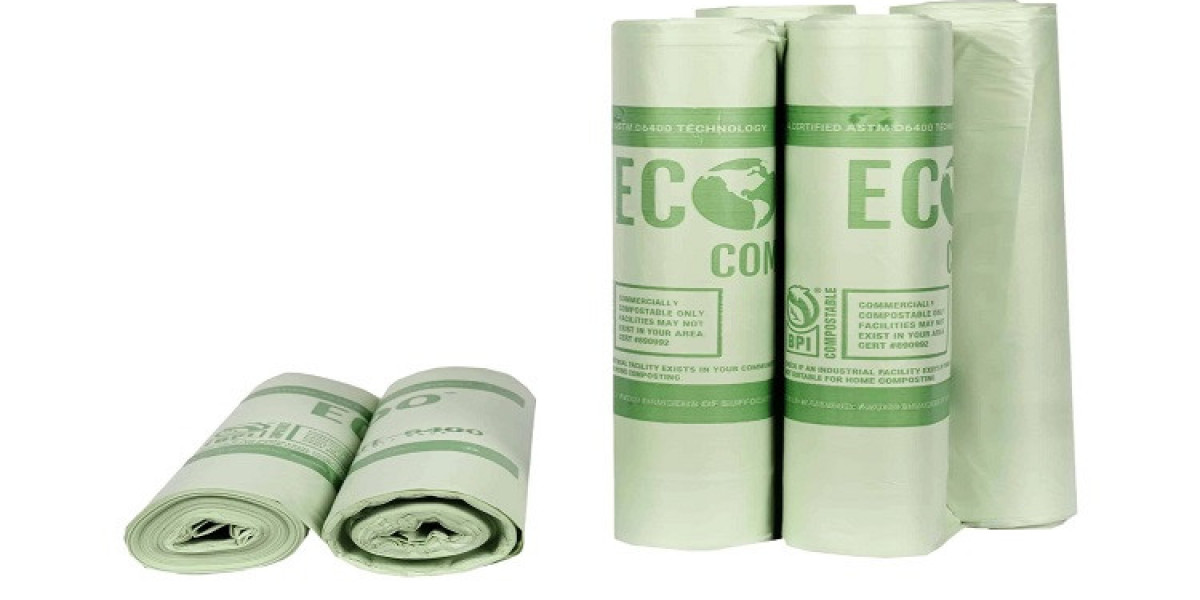Plastic pollution has become an alarming issue that can no longer be ignored. Our planet is drowning in a sea of plastic waste, with devastating consequences for our environment and wildlife. But fear not! There is hope on the horizon. It's time to take matters into our own hands and embrace sustainable solutions right at home. One simple yet impactful step we can all take is by switching to biodegradable garbage bags. These eco-friendly alternatives are revolutionizing the way we dispose of our trash, making it easier than ever to reduce waste, support green practices, and protect Mother Earth herself! So let's dive deeper into the world of biodegradable garbage bags and discover how they can make a significant difference in creating a greener future!
What are biodegradable garbage bags and how are they different from traditional plastic bags?
Biodegradable garbage bags are a sustainable alternative to traditional plastic bags when it comes to waste disposal. These bags are designed to break down and decompose over time, unlike regular plastic bags that can take hundreds of years to degrade.
So, what makes biodegradable garbage bags different? Well, they are typically made from natural materials such as plant-based polymers or compostable plastics derived from renewable resources. This means that they don't contribute to the massive amount of plastic pollution in our environment.
Not only do biodegradable garbage bags help reduce waste by breaking down naturally, but they also support eco-friendly practices. By opting for these bags, you're actively participating in the movement towards sustainability and reducing your carbon footprint.
In addition to their environmental benefits, using biodegradable garbage bags helps protect our ecosystems. When traditional plastic breaks down into microplastics, it can contaminate soil and water sources, harming wildlife and entering our food chain. Biodegradable options minimize this risk and provide a safer solution for waste disposal.
It's important to note that proper disposal is crucial for maximizing the effectiveness of biodegradable garbage bags. They should be disposed of in municipal composting facilities or designated green bins where they can undergo controlled decomposition.
With an increasing demand for sustainable alternatives, there are now various brands and types of biodegradable garbage bags available on the market. Some offer additional features like extra strength or odor control while still maintaining their eco-friendly qualities.
Benefits of using biodegradable garbage bags: reducing waste, supporting eco-friendly practices, and protecting the environment
When it comes to sustainable living, every small change we make can have a significant impact. One simple yet effective step towards reducing waste and protecting the environment is by using biodegradable garbage bags. These eco-friendly alternatives are made from plant-based materials and are designed to break down naturally over time.
By opting for biodegradable garbage bags, you contribute to reducing the amount of plastic waste that ends up in landfills or pollutes our oceans. Traditional plastic bags can take hundreds of years to decompose, whereas biodegradable ones typically break down within months or years.
Not only do these environmentally friendly options help reduce waste, but they also support eco-friendly practices. The production process of biodegradable garbage bags involves less energy consumption and carbon emissions compared to traditional plastic bag manufacturing.
Furthermore, using biodegradable garbage bags helps protect the environment by minimizing harm caused by plastics. Plastic pollution poses a significant threat to wildlife and ecosystems around the world. By choosing biodegradable alternatives, you actively participate in safeguarding our planet's delicate balance.
Making the switch is easy! Simply replace your regular plastic trash bags with biodegradables ones when disposing of household waste. Many brands offer various sizes and strengths suitable for different needs – whether it's kitchen scraps or heavier items like glass bottles.
Incorporating these eco-friendly solutions into your daily life not only benefits the environment but also sets an example for others around you. Small changes add up over time, creating a ripple effect towards sustainable practices on a larger scale.
Remember that proper disposal is essential for maximizing the benefits of using biodegradable garbage bags. Check if your local recycling facilities accept them or consider composting organic waste along with these bags instead.
Choose sustainability at home by making conscious choices like switching to biodegradable garbage bags today! Together, let's embrace green alternatives that reduce waste, support eco-friendly practices, and protect our precious environment – one trash bag at a time.
How to properly dispose of biodegradable garbage bags
Proper disposal of biodegradable garbage bags is essential to ensure they fulfill their eco-friendly purpose. Unlike traditional plastic bags, which can take hundreds of years to decompose, biodegradable options break down naturally over a shorter period of time. Here are some tips on how to dispose of these bags responsibly.
First and foremost, it's important to check the packaging or label for specific instructions from the manufacturer. Some biodegradable bags can be composted along with organic waste, while others may need to be taken to specialized recycling facilities.
If your local municipality provides curbside composting or green waste collection, you can place your used biodegradable garbage bag in the designated bin. This helps divert organic matter away from landfills and promotes nutrient-rich soil production.
In cases where composting is not available, you may have the option to dispose of them in regular trash bins. However, keep in mind that even though these bags are designed to break down faster than traditional plastics, landfill conditions might hinder their decomposition process.
Comparison of different brands and types of biodegradable garbage bags on the market
When it comes to choosing biodegradable garbage bags, there are several options available on the market. Each brand and type offers its own unique features and benefits, making it important to consider your specific needs and preferences.
One popular brand is EcoSafe, known for their high-quality compostable bags made from plant-based materials such as cornstarch. These bags are designed to break down in commercial composting facilities, reducing waste sent to landfills. Another option is BioBag, which produces biodegradable garbage bags using a blend of renewable resources like GMO-free crops.
If you're looking for durability, Earth Rated offers extra-strong biodegradable trash bags made from recycled materials. They also come with convenient handles for easy disposal. On the other hand, Green Legacy's garbage bags are made entirely from vegetable starches and plant oils without any plastic additives.
For those seeking a budget-friendly option, Bag-To-Nature provides affordable biodegradable trash bags that degrade within 90 days when exposed to oxygen and sunlight.
Remember that not all biodegradable garbage bag brands are created equal; some may decompose faster or have stronger environmental credentials than others. It's always a good idea to read product labels carefully and do your own research before making a purchase decision.
Tips for incorporating biodegradable garbage bags into your
Making the switch to biodegradable garbage bags is a small but impactful step towards creating a more sustainable future. Here are some tips to help you incorporate these eco-friendly alternatives into your daily routine:
1. Raise awareness: Educate your family and friends about the importance of reducing plastic waste and using biodegradable options. Spread the word on social media or organize community events to raise awareness.
2. Start in the kitchen: Begin by using biodegradable garbage bags in your kitchen, where most of our household waste is generated. These bags are strong enough to handle food scraps, wrappers, and other organic materials.
3. Separate recyclables: Ensure that you properly separate recyclable items from non-recyclable ones when disposing of waste. This will further reduce environmental impact and make recycling processes more efficient.
4. Opt for composting: Consider starting a home composting system alongside using biodegradable garbage bags. Composting not only reduces landfill waste but also produces nutrient-rich soil for gardening purposes.
5. Encourage others: Lead by example and encourage others around you – be it at work, school, or within your neighborhood – to adopt biodegradable garbage bags as well.
6. Use them on-the-go: Don't limit yourself to just using these bags at home; take them with you when going out too! Whether it's a picnic or a trip to the park, use biodegradable garbage bags for collecting trash so that it can be disposed of responsibly later on.
7. Dispose correctly: When it comes time to dispose of used biodegradable garbage bags, make sure they end up in appropriate bins or compost piles if they're certified as suitable for composting.



